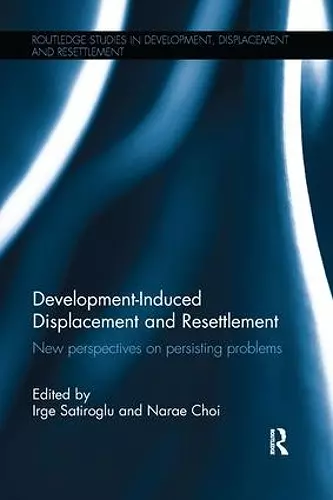Development-Induced Displacement and Resettlement
New perspectives on persisting problems
Irge Satiroglu editor Narae Choi editor
Format:Paperback
Publisher:Taylor & Francis Ltd
Published:27th Jan '17
Currently unavailable, and unfortunately no date known when it will be back
This paperback is available in another edition too:
- Hardback£150.00(9781138794153)

Every year millions of people are displaced from their homes, livelihoods and communities due to land-based development projects. There is no limit to what can be called a ‘development project’. They can range from small-scale infrastructure or mining projects to mega hydropower plants; can be public or private, well-planned or rushed into. Knowledge of development-induced displacement and resettlement (DIDR) remains limited even after decades of experience and research. Many questions are yet unanswered: What is "success" in resettlement? Is development without displacement possible or can resettlement be developmental? Is there a global safeguard policy or do we need an international right ‘not to be displaced’?
This book revisits what we think we know about DIDR. Starting with case studies that challenge some of the most widespread preconceptions, it goes on to discuss the ethical aspects of DIDR. The book assesses the current laws, policies and rights governing the sector, and provides a glimpse of how the displaced people defend themselves in the absence of effective governance and safeguard mechanisms.
This book is a valuable resource for students and researchers in development studies, population and development, and migration and development.
"Theory meets experience in this volume of essays. It is about what actually happens to people and to communities when they become the development-induced-displaced. In querying the (im)probabilities of rehabilitation, it produces evidence from the ground that demands to be acknowledged while thinking about development, risk and loss." –Usha Ramanathan, research fellow at the Centre for the Study of Developing Societies.
"Forced population displacement and resettlement is among today’s most complex and controversial development problems globally. Despite advanced planning, displacement is virtually always a mess and a breeding ground for unanticipated consequences and impoverishment risks. This book’s co-authors invite the readers to a candid exploration of many questions seldom asked about development: Is success possible in recovery post-displacement? Are there adequate national and global safeguards against impoverishing the resettlers? Can powerless displaced people be empowered to stand up for their human rights? Yet despite big hurdles the book contends that realistic and innovative solutions to the difficult – but not intractable – problems of displacement and resettlement do exist. But how can enough political will be mobilised for applying the known solutions? Professors, students and development practitioners, specialists in building the infrastructures that require displacement, sociologists and lawyers, economists, political scientists, and philosophers, can understand better the contradictions of the world we live in due to the perspectives, research, and findings reported in this book." –Prof. Michael M. Cernea, NR Senior Fellow, Brookings Institution, Washington, DC.
"This aptly titled volume of edited essays provides state of the art analysis of current thinking and case study evidence on the continuing challenges of development-induced displacement and resettlement. Deploying an innovative cross cutting structure that covers assumptions, ethics, policy, and voice and power, the book will be of immense value to academics, policy makers and activists alike."– Prof. Roger Zetter, Professor Emeritus in Refugee Studies, University of Oxford
"Development-induced resettlement is one of the most important issues associated with large scale infrastructure construction, urbanization and industrialization globally. The impoverishment risks caused by resettlement have been recognized by affected people, international organizations, governments, developers, consultants and civil society. Successful resettlement is a result of multiple factors such as policy, compensation, patterns of rehabilitation and reconstruction, planning, databases and management. China has the largest scale resettlement population in the word. Since the 1980s a number of excellent practices have been created but have received little attention. This book presents an excellent opportunity to examine both the successes and the lessons learnt from development-induced resettlement and will be an excellent asset for all researchers, policy-makers and practitioners from China and all over the world." – Prof. SHI Guoqing, Professor and Director of National Research Center for Resettlement, Hohai University, China
ISBN: 9781138630420
Dimensions: unknown
Weight: 453g
240 pages